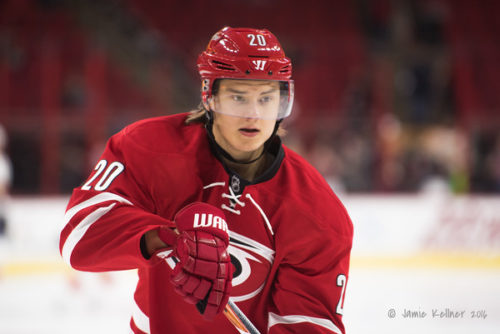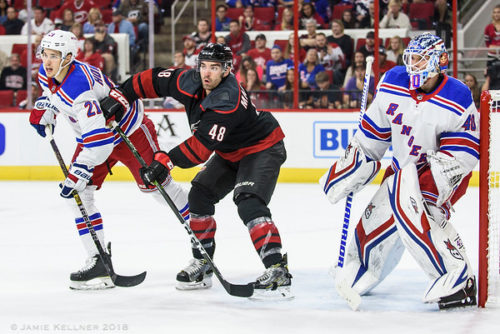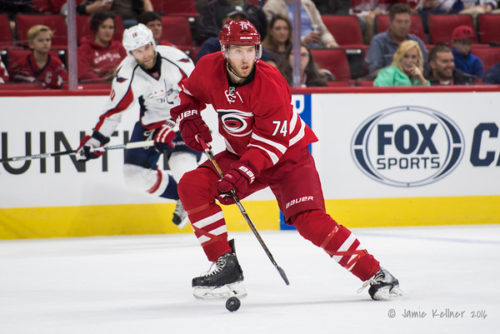The Carolina Hurricanes had been productive prior to Thursday’s game in Calgary going 2-1-1, but through four games I would not say that the team had really found a winning model that was repeatable. The season opening win was fun but was not great defensively or in net. The next two games featured a power outage offensively and netted only a single point via late-game Jeff Skinner heroics. And Tuesday’s 5-3 win over Edmonton looked great at the headline level, but in my opinion was actually a step in the wrong direction in terms of style and quality of play. The Hurricanes uncharacteristically lost the shot and possession battles by a wide margin and rode a combination of strong play in net by Cam Ward and highly efficient and opportunistic scoring to a win that they probably did not deserved.
But Thursday’s win in Calgary was a different story. By no means was the game perfect, but I think it was the best game that the team played in terms of playing a solid game that featured what could be a repeatable format that matches their skill set and identity.
The Hurricanes played fast and aggressive in all three zones making lie miserable for the Flames in terms of winning, keeping or advancing the puck. Despite only scoring two goals, the Hurricanes generated a decent number of chances both at even strength and on the power play. The Hurricanes were generally sound defensively, and goalie Scott Darling was strong when he needed to be but not overtaxed. The net result was a game in which the Hurricanes used speed and assert play to create more and better chances offensively, made the opponent work hard to earn a lower volume and quality of chances and then had a strong last line of defense in net to make it even tougher on the opponent.
For a team built more for speed and less for physical play and with an increasing amount of skill and that is part way through a transformation that sees its defense become its top strength, I think Thursday’s game is pretty close to what the Hurricanes need to do on an every game (or near every game basis) to push up into the top half of the NHL.
Aside from evaluation of level of play, the results continue to be worth noting. Even if Saturday nets a loss, the Hurricanes will return for the four-game road trip with a very respectable 2-2 record. And even with a Saturday loss, the Hurricanes will be playing at a 96-point pace through six games including four on the road which is a playoff pace.
Not surprisingly, my ‘what I’m watching’ for Saturday’s game is chock full of trying to repeat Thursday’s effort.
‘What I’m watching’ for the Carolina Hurricanes versus the Dallas Stars
1) More of the same in net
Breaking from struggles in net in recent years, the Hurricanes netminding has been a positive for four consecutive games. Darling’s’ 1-1-1 mark in his last three starts is unfair given the fact that he has allowed only a paltry 1, 2 and 1 goals respectively in regulation in his last three starts. In a league where the goal is generally to score three and give up two, that is plenty good enough. Similarly portrayed incorrectly by the headline statistics, Ward was good and a key part of Tuesday’s win despite giving up three goals behind a team that did not play well that night. I lean toward going back to Ward after his strong start on Tuesday to keep him in the mix and to use stretches when both goalies are playing well to keep Darling’s workload reasonable. But the alternative of instead slotting Ward for half of the back-to-back set next Thursday and Friday also makes sense. Regardless of who plays Saturday, I will be watching to see if the netminding which has been a recent strength can continue.
2) More/new participants on offense
One of the significant but underlying changes underway right now is the realization of the benefits of depth at the forward position. Only a couple years ago, a player like Teuvo Teravainen would have easily slotted somewhere between #4 and #6 on a scoring depth chart. And the players who slotted #7 through #10 were reaches like Chris Terry, Riley Nash, Patrick Dwyer, Andrej Nestrasil, Joakim Nordstrom and others many of who were borderline NHLers or at a minimum would be slotted somewhere between #11 and #13 on teams with more scoring depth. The Hurricanes are maybe still light on top-end scoring talent, but the depth in the bottom of the middle of the forward group is significantly better. Teuvo Teravainen has really only had a single standout game offensively, but his two early goals on Tuesday were a huge factor in propelling the Hurricanes to a win. Justin Williams has been an odd version of quiet offensively not so much making highlight reel plays but still leading the team in scoring with enough good plays and the help of scoring-capable line mates. Either of Brock McGinn or Janne Kuokkanen who have been in and out of the lineup have more scoring potential than the team has head on the bench in years.
At a more general level, the Hurricanes are making progress in terms of having 8-10 players in the lineup with a reasonable chance of scoring. As demonstrated by the power outage in games two and three, it is not the same as having a pure, high-end scoring line that leads the way on a nightly basis, but there are at least more players with the potential to be an offensive leader in a win like Teravainen did on Tuesday even if it is on an intermittent basis.
On Saturday, I will be watching to see if the Hurricanes offense can continue to come in waves. Skinner has actually not hit one of those stretches where he is just dominant and dangerous every shift, but his three goals in five games is still an impressive pace. Jordan Staal is clicking offensively right now. Teravainen is only a couple games removed from his two-goal outburst. On Saturday, I will be watching to see if a player or two from Sebastian Aho, Elias Lindholm or Victor Rask who have been quiet in recent games be the next to chip in and further the Hurricanes’ ‘scoring by committee and depth’ approach.
3) Building confidence across the blue line and managing minutes
I am on record as being generally positive on Bill Peters, but if pressed to make a short list of areas where he could have been better in 2016-17, somewhere near the top of the list would be managing the goalies. I will skip the long version of this which I wrote up previously, but I think one takeaway from the overdone stretch of running Cam Ward each every game and his subsequent drop in level of play is the importance of finding a balance between doing whatever it takes to collect two points each and every night but also being careful to consider the physical challenges of a long and grinding 82-game NHL season.
Tuesday and Thursday’s wins both featured a heavy dose of ‘just run Slavin/Pesce out there again.’ Jaccob Slavin playe 27:34 on Tuesday which is a HUGE amount of ice time, especially for a non-overtime game. He followed that up with another 24:53 on Thursday. Slavin is averaging 24:57 of ice time through five games which maybe does not sound like a drastic increase from the 23:26 that he averaged in 2016-17 and seemed to finish fine. But there is some ceiling where it becomes too much and takes a toll, and given how critical Slavin is to the team’s defense, I would be careful not to push limits too far. Brett Pesce is in a somewhat similar boat averaging 22:48 thus far in 2017-18 which is up from 21:12 in 2016-17. Also worth noting is that neither player sees much time on the power play but does play on the penalty kill which means that their minutes are slightly more taxing that the usual defenseman workhorse model where the player logs some amount of power play time which is less taxing.
The return of Trevor van Riemsdyk is a significant boost which could help. It is also somewhat easier to spread minutes at home where Peters can pick match ups. And there is some amount of doing what it takes to get two points that makes sense. But at the end of the day, Peters does need to be careful that he does not run Slavin and/or Pesce into a physical wall like I think he did with Ward last season.
So while mostly rooting for ‘whatever it takes to get any kind of win’ on a nightly basis, I will also be watching to see what degree the other defense earn, receive and reward trust from Bill Peters, and I will also be watching to see if Peters can keep Slavin and Pesce’s minutes to a manageable level most notes.
The puck drops at 8pm on Fox Sports Carolinas with John, Tripp and Mike.
Go Canes!




I am not looking for much offense tonight. Ben Bishop has been tough so far. Three goals would be great, but a 2-1 victory is just as likely.
Part of what is under appreciated about the current crop of Canes forwards is their ability to limit the possession of the other team. It is not always as successful as being able to score quickly and often, but it makes the other team’s game much harder to play. The forwards (especially Staal, Williams, Kruger–but maybe surprisingly also Teravainen and Ryan) are really good at generating more shots than the opponent. Obviously the Edmonton game was a huge outlier in this early season.
I do expect Aho to score goals. Hopefully, the first will come tonight. He had several good plays and one good shot on the power play Thursday.
Fleury has exceeded expectations–the “save” he made with Darling out of the net was as impressive as any by a D-man so far. His passes are sound if not dangerous. With TVR back, all three pairings should be an asset when they are on the ice.
As stated about the Calgary game, the team is starting to play well in all zones. That should continue tonight. But the game might end up 2-1 even playing another strong game.
Part of keeping the top D pair fresh is driving possession, the importance of possession can’t be overstated. The toll of the Edmonton minutes (mostly in our end) was much greater than the toll of the Calgary minutes (majority in their end). If TOI was split by possession, the component parts would be a better indicator of wear and tear on our D.
An impressive part of the Slavin/Pesce game is driving possession. They are statistically more capable of taking away the puck and transitioning to the O zone than most defenseman – even though their minutes are weighted towards top lines.
That said I agree completely with the need to keep their minutes within the bounds of human tolerance. They are much too important to overuse.
Excellent point ashevillecaniac about the type of minutes. Minutes spent in their own defensive zone and/or chasing the puck on defense take much more of a toll.
I completely disagree with you guys when it comes to overusage of the defenseman. If this was last year or the year before during the ‘rebuild’ I would agree. However, the Canes are firmly a team that is trying to make the playoffs right now. If you ask other coaches that have stud #1 dmen, or even just one entire elite pairing, do you think they are highly worried about running them out there for 27 minutes a night? I think those coaches are more highly worried of having to run out their other pairings as opposed to their top guys. Slavin and Pesce are young and our best defensive pairing, but enough babying them at this point, they are only going to get better and they are young so they should play as many minutes a night as the Canes need to get the win. If the reason our whole season falls apart is because come March, Slavin and Pesce magically run out of steam like you guys are mentioning, and we lose because Faulk and Hanifin get wrecked in defensive zone situations, then the problem wasn’t balancing the minutes of the blueliners, the problem WAS the blueliners you know what i’m saying? Is it more dangerous for us to use Slavin at 25 minutes per game as he is a 23 year old young guy who is clearly in great shape? Or is it more dangerous for Minnesota to run our Ryan Suter for 30 minutes a game when he is 30+ years old and he’s done that minute load for MANY years now? The answer is NEITHER. Because both those guys are elite defensemen who make their team better when they are on the ice so their coaches decide that using them is more worth it than ‘resting them’. I trust Slavin, Pesce and Bill Peters to know more about their conditioning and the potential of getting tired than we do, so I’m all for slogging Pesce and Slavin with as many minutes as needed to get victories! Go Canes!
I agree FIFTY… at that age I could run all day, and I was NOWHERE NEAR THE STUDS THESE GUYS ARE!
Not a real problem…
My take on this game, we play as well as last game…WE WIN!
That said… Dallas has a lot of good quality, so it won’t be easy.
Puckgod has his ducks in a row. Get the WIN. Based upon what I have seen so far having watched many teams play I have come to the following conclusions. All teams and players make mistakes throughout a game. Sometimes teams capitalize on other team’s mistakes and sometimes they don’t. Thus the key to winning is to make less glaring mistakes and to capitalize on the opponents mistakes. If a team doesn’t capitalize on the opponents mistakes, they better make very few themselves and/or have the better goalie performance. That being said, I will be watching for who makes more (quantity) glaring mistakes (leading to scoring chances) and who capitalizes more (scores) on the other’s mistakes. I think it is reasonable to assume we will make less glaring errors on defense than Dallas. The question then just comes down to can we capitalize on two or three of their glaring mistakes. Our style of play (the Calgary game) should draw more penalties on Dallas and that gives us an increased ability to match Dallas’ scoring ability.
I absolutely love your comments on mistake making. I think now having seen the way you’ve put it, I can explain why Faulk actually is around league average in shot suppression and is considered a good defenseman. Faulk ALWAYS makes mistakes, but so far this year it seems that other teams have not CAPITALIZED on the mistakes he has made. That both has to do with luck, but ALSO because Faulk is actually pretty good at making a mistake and then ensuring the other team doesn’t capitalize by scrambling back to recover or a wild stick check or a penalty. But regardless, if they didn’t score after his mistake and seconds later we clear the zone, should we really get our panties in a knot over the fact he didn’t exit the zone at light speed like Pesce and Slavin?
Last year’s game in Dallas came when we really need a win (maybe after the bye week or all-star game, I can’t remember), and we laid an egg.
I’m looking for this team to come out with a killer instinct and to start on time.
Last year was on the tail of that 5 game losing streak. So we coughed one up less than a minute in. You’re right, we need to push early.